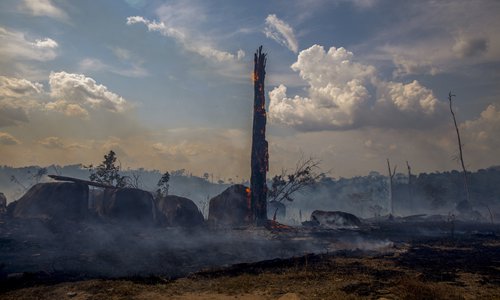No let-up in global rainforest loss as coronavirus brings new danger
Source:Reuters Published: 2020/6/2 18:23:41
Tropical rainforests disappeared at a rate of one soccer field every six seconds in 2019, researchers said on Tuesday, urging countries to include forest protection in post-pandemic plans.

"Primary forests are the areas we are the most concerned about - they have the biggest implications for carbon and biodiversity," said Mikaela Weisse, a project manager at the GFW forest monitoring service, run by the World Resources Institute.
"The fact that we are losing them so rapidly is really concerning," she told Reuters.
Loss of primary forest, which hit a record high in 2016 and 2017, was 2.8 percent higher in 2019 than the year before.
Agricultural expansion, wildfires, logging, mining and population growth all contribute to deforestation, according to GFW researchers.
Cutting down forests has major implications for global goals to curb climate change, as trees absorb about a third of the planet-warming greenhouse gas emissions produced worldwide.
Forests also provide food and livelihoods for people who live in or near them, are an essential habitat for wildlife, and aid tropical rainfall.
Governments preparing post-coronavirus economic stimulus plans should include measures to protect forests, said Weisse.
In the short-term, the virus may weaken enforcement of forest laws, with people taking advantage of that to commit environmental crimes, she warned.
In the medium-term, economic stress could hike pressure for more extractive industries in forests or larger-scale agriculture, she added.
Workers coming home from cities after losing jobs could also turn to forests to help feed their families, increasing the risk of deforestation, she said. "The situation has changed," Weisse said of the COVID-19 pandemic. "What we need to do has also changed."
The top three countries for primary forest loss in 2019 - Brazil, the Democratic Republic of the Congo (DRC) and Indonesia - have remained largely the same this century, GFW researchers said.
Brazil accounted for more than a third of all primary forest loss in 2019 at 1.36 million hectares.
Neighboring Bolivia experienced record-breaking primary forest loss.
Newspaper headline: 2019 witnesses 3.8 million hectares of deforestation

View of a burnt area of forest in Altamira, Para state, Brazil, on Tuesday. Brazil will accept foreign aid to help fight fires in the Amazon rainforest on the condition the Latin American country controls the money, the president's spokesman said Tuesday. Photo: AFP
The loss in 2019 of 3.8 million hectares of tropical primary forest, which means intact areas of old-growth trees, was the third biggest decline since the turn of the century, according to data from Global Forest Watch (GFW)."Primary forests are the areas we are the most concerned about - they have the biggest implications for carbon and biodiversity," said Mikaela Weisse, a project manager at the GFW forest monitoring service, run by the World Resources Institute.
"The fact that we are losing them so rapidly is really concerning," she told Reuters.
Loss of primary forest, which hit a record high in 2016 and 2017, was 2.8 percent higher in 2019 than the year before.
Agricultural expansion, wildfires, logging, mining and population growth all contribute to deforestation, according to GFW researchers.
Cutting down forests has major implications for global goals to curb climate change, as trees absorb about a third of the planet-warming greenhouse gas emissions produced worldwide.
Forests also provide food and livelihoods for people who live in or near them, are an essential habitat for wildlife, and aid tropical rainfall.
Governments preparing post-coronavirus economic stimulus plans should include measures to protect forests, said Weisse.
In the short-term, the virus may weaken enforcement of forest laws, with people taking advantage of that to commit environmental crimes, she warned.
In the medium-term, economic stress could hike pressure for more extractive industries in forests or larger-scale agriculture, she added.
Workers coming home from cities after losing jobs could also turn to forests to help feed their families, increasing the risk of deforestation, she said. "The situation has changed," Weisse said of the COVID-19 pandemic. "What we need to do has also changed."
The top three countries for primary forest loss in 2019 - Brazil, the Democratic Republic of the Congo (DRC) and Indonesia - have remained largely the same this century, GFW researchers said.
Brazil accounted for more than a third of all primary forest loss in 2019 at 1.36 million hectares.
Neighboring Bolivia experienced record-breaking primary forest loss.
Newspaper headline: 2019 witnesses 3.8 million hectares of deforestation
Posted in: CROSS-BORDERS,WORLD FOCUS